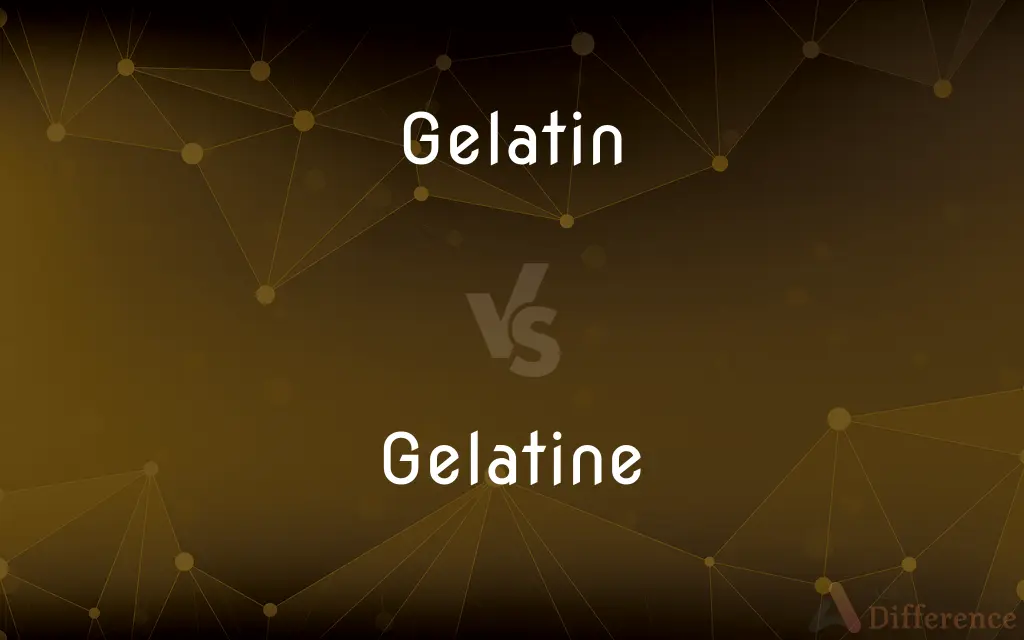Gelatin vs. Gelatine — What's the Difference?
By Maham Liaqat & Urooj Arif — Updated on March 6, 2024
Gelatin is the common spelling in American English, while gelatine is used in British English, both referring to the same substance.

Difference Between Gelatin and Gelatine
Table of Contents
ADVERTISEMENT
Key Differences
Gelatin, in American English, is a substance derived from collagen found in animal bones and connective tissues and is used in food, medications, and cosmetic products. It's known for its ability to form gels and is a common ingredient in recipes like jellies, desserts, and marshmallows. On the other hand, gelatine, the British English spelling, refers to the exact same substance and shares all the same uses and properties. The only difference lies in the regional spelling preference, reflecting the variations between American and British English.
While gelatin is the preferred spelling in American cookbooks, food labels, and scientific literature, gelatine is commonly found in similar contexts within the UK, Australia, and other countries using British English norms. This variation in spelling does not impact the product's use or consumer perception but is an important distinction for ensuring clarity in written communication across different English-speaking regions.
In the culinary world, chefs and recipe writers might use the term gelatin or gelatine depending on their audience's regional English. This ensures that their recipes are accessible and understandable, whether they're catering to an American audience familiar with "gelatin" or a British audience more accustomed to "gelatine." Despite the spelling differences, the methods of using gelatin/gelatine in cooking and baking remain the same, including dissolving it in liquid, heating, and then cooling to form a gel.
In scientific and industrial contexts, professionals choose the spelling based on the standard conventions of their region or the international audience they are addressing. For example, American scientific papers and product labels predominantly use "gelatin," while British and Commonwealth countries' publications and products might prefer "gelatine." Regardless of the spelling, the chemical properties and applications in pharmaceuticals, photography, and cosmetic products are identical.
The packaging might feature the term gelatin or gelatine depending on where the product is sold. This distinction helps align the product with local language norms, making it more familiar to consumers. However, the nutritional value, dietary considerations (such as being unsuitable for vegetarians and vegans), and usage instructions do not differ based on the spelling.
ADVERTISEMENT
Comparison Chart
Spelling Region
American English
British English
Usage
Food, medications, cosmetics
Food, medications, cosmetics
Properties
Forms gels, derived from animal collagen
Forms gels, derived from animal collagen
Culinary Application
Jellies, desserts, marshmallows
Jellies, desserts, marshmallows
Scientific & Industrial
Used in pharmaceuticals, photography
Used in pharmaceuticals, photography
Compare with Definitions
Gelatin
A protein used to make gels.
Gelatin is key for making this cheesecake set.
Gelatine
British spelling for a gelling agent.
Gelatine is used in many British desserts.
Gelatin
Derived from animal parts.
Gelatin comes from boiling bones and hides.
Gelatine
Comes from collagen.
Gelatine's gelling properties are due to collagen.
Gelatin
Used in food and medicine.
Gelatin capsules are common in supplements.
Gelatine
Found in jellies and sweets.
Gelatine gives gummy bears their chewy texture.
Gelatin
Not vegetarian.
Vegetarian alternatives to gelatin include agar and pectin.
Gelatine
Melts when heated.
Heat gently until the gelatine melts completely.
Gelatin
Soluble in hot water.
Dissolve gelatin in hot water for this recipe.
Gelatine
Alternative for vegans.
For a vegan version, replace gelatine with carrageenan.
Gelatin
Gelatin or gelatine (from Latin: gelatus meaning "stiff" or "frozen") is a translucent, colorless, flavorless food ingredient, commonly derived from collagen taken from animal body parts. It is brittle when dry and gummy when moist.
Gelatine
A colorless or slightly yellow, transparent, brittle protein formed by boiling the specially prepared skin, bones, and connective tissue of animals and used in foods, drugs, and photographic film.
Gelatin
A colorless or slightly yellow, transparent, brittle protein formed by boiling the specially prepared skin, bones, and connective tissue of animals and used in foods, drugs, and photographic film.
Gelatine
Any of various similar substances.
Gelatin
Any of various similar substances.
Gelatine
A jelly made with gelatin, used as a dessert or salad base.
Gelatin
A jelly made with gelatin, used as a dessert or salad base.
Gelatine
A thin sheet made of colored gelatin used in theatrical lighting. Also called gel.
Gelatin
A thin sheet made of colored gelatin used in theatrical lighting. Also called gel.
Gelatine
Same as Gelatin.
Gelatin
A protein derived through partial hydrolysis of the collagen extracted from animal skin, bones, cartilage, ligaments, etc.
Gelatine
A colorless water-soluble glutinous protein obtained from animal tissues such as bone and skin
Gelatin
An edible jelly made from this material.
Gelatin
A thin, translucent membrane used as a filter for photography or for theatrical lighting effects.
Gelatin
Animal jelly; glutinous material obtained from animal tissues by prolonged boiling. Specifically (Physiol. Chem.), a nitrogeneous colloid, not existing as such in the animal body, but formed by the hydrating action of boiling water on the collagen of various kinds of connective tissue (as tendons, bones, ligaments, etc.). Its distinguishing character is that of dissolving in hot water, and forming a jelly on cooling. It is an important ingredient of calf's-foot jelly, isinglass, glue, etc. It is used as food, but its nutritious qualities are of a low order.
Gelatin
A colorless water-soluble glutinous protein obtained from animal tissues such as bone and skin
Gelatin
An edible jelly (sweet or pungent) made with gelatin and used as a dessert or salad base or a coating for foods
Gelatin
A thin translucent membrane used over stage lights for color effects
Common Curiosities
Are gelatin and gelatine the same?
Yes, they are the same product, with the spelling difference reflecting American vs. British English.
What is gelatin/gelatine?
A substance derived from animal collagen used to form gels in food, medicine, and cosmetics.
Is there a difference in quality between gelatin and gelatine?
No, the quality depends on the manufacturer, not the spelling.
Can I use gelatin and gelatine interchangeably in recipes?
Yes, they are the same substance and can be used interchangeably, regardless of spelling.
Why are there two spellings, gelatin and gelatine?
The spelling varies between American English (gelatin) and British English (gelatine).
Is gelatin/gelatine vegetarian?
No, it is derived from animal products and not suitable for vegetarians or vegans.
What are vegetarian alternatives to gelatin/gelatine?
Agar-agar, pectin, and carrageenan are common vegetarian alternatives.
How do I dissolve gelatin/gelatine?
Dissolve it in warm liquid as per the recipe instructions, ensuring it's fully dissolved before use.
Can gelatin/gelatine be used in vegan products?
No, it's animal-derived, but there are vegan alternatives for similar applications.
Is gelatin/gelatine allergenic?
Rarely, but some individuals may have allergies or sensitivities to it.
Can gelatin/gelatine go bad?
Yes, it can degrade over time, especially if not stored properly.
How do I choose between gelatin and gelatine in international recipes?
Choose based on your region's spelling but note that the substance is the same.
Are all gelatin/gelatine products halal?
Not all; look for products specifically labeled as halal gelatin/gelatine.
Can gelatin/gelatine help in joint health?
Some studies suggest it can contribute to joint health due to its collagen content.
Do gelatin and gelatine have the same nutritional value?
Yes, their nutritional values are identical, providing protein and amino acids.
Share Your Discovery

Previous Comparison
Brack vs. Crack
Next Comparison
Correspondence vs. CorrespondentsAuthor Spotlight
Written by
Maham LiaqatCo-written by
Urooj ArifUrooj is a skilled content writer at Ask Difference, known for her exceptional ability to simplify complex topics into engaging and informative content. With a passion for research and a flair for clear, concise writing, she consistently delivers articles that resonate with our diverse audience.















































